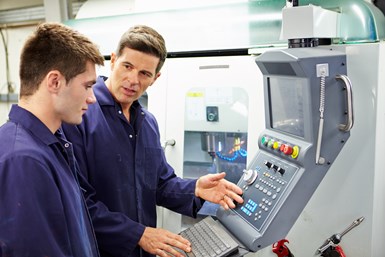Proactive Plans Beat Pandemic Problems
Manufacturing industry challenges like the skills gap only got worse with COVID-19. Proactive planning helps businesses stay afloat, pandemic or not.
The past five years have been very stressful for those of us working on the shop floor. During this time, the movement to reshore supply chains back to North America began to take hold, but it also brought some challenges. The shift caused a massive demand for North American goods, and companies had to hire to fulfill this demand. This exacerbated the skilled labor shortage, or what we often call the skills gap.
While companies worked through how to reshore supply chains, machining technologies were advancing rapidly. New and expanded technologies are designed to help companies thrive, but some shops have had trouble keeping up with the latest productivity tools. Many companies that did not embrace these new tools fell far behind.
While working through these new challenges, we hit the pandemic. That was something manufacturing did not see coming! We have never gone through a global pandemic that affected businesses on such a large scale. With the outbreak of COVID-19, manufacturing slowed dramatically or, in some cases, actually stopped. Some businesses let go of their people quickly in the beginning. Technological purchases were further put on hold. With all the chaos it brought, the pandemic allowed us to ignore our previous labor and technology challenges because companies went into survival mode.
As vaccines rolled out, companies were able to restart in a somewhat normal way. In many cases, business increased rapidly as the threat of the pandemic was moderated. Unfortunately, to no one’s surprise, skilled labor shortages became worse than before. Other emerging difficulties, like skyrocketing material costs and supplier shortages, added to the list of challenges. Technology did not seem to take a break during the pandemic; instead, competition from innovators ramped up. This left manufacturing and, in our case machining, in a very stressful situation. What do we do?
In my opinion, the best thing to do is to take action. Be proactive, and start making (or keep making) plans that will help your business through ongoing challenges. Challenges are also opportunities, and by taking action and making the right moves, we can take advantage of these opportunities.
We need to act on:
- Taking advantage of reshoring. Our customers have seen that offshoring involves a lot of complicating factors, especially in a pandemic. During COVID-19, supply chains were broken and companies scrambled to create new, shorter ones. Customers also saw shipping costs skyrocket, which caused them to be more willing to do business closer to home. Companies are looking for businesses and suppliers that are willing to provide high-quality components at a sustainable price and get delivered in a reasonable time.
- Addressing the skills gap. The labor shortage has been an ongoing issue for years and will only become worse without concentrated effort. The fact is that we are not running out of people, we are running out of trained and skilled people. We need to start training new and potential employees in a serious way and stop talking about it or complaining. A serious effort to close the skills gap means we need to become active in our local communities and support training at all levels. A large concentrated effort is needed, but closing the skills gap is achievable.
- Accepting that technology will keep changing. Ignoring tech advances is not an option. We have seen large companies destroyed by doing just that. The problem in many cases is that it seems overwhelming. This feeling can cause paralysis. But doing nothing puts us further behind and makes getting up to speed with technology feel even more onerous. The best option is to do something as opposed to nothing. It can start with small changes or improvements and move toward bigger ones as the smaller ones take hold. Many companies try to implement big changes all at once to catch up, but fail due the complexity of implementing these changes. The key to remaining relevant is adopting new technologies at a sustained pace. Staying up to date is manageable when companies start small and keep moving forward consistently but incrementally.
- Increasing communication with customers. Material shortages and escalating costs will always happen during trying economic times. The key for success here is to make sure you have your customers covered. When the dust settles after a disruptive event (like a pandemic), demand increases. Materials, tooling and equipment will likely be in short supply. This means businesses need to prepare ahead of time for the upsurge and have those discussions with customers. We can not play a wait-and-see game, because history tells us that being proactive is the best strategy. The key is to stay tight with your customers.
It seems like everyone views the pandemic as a once-in-a-lifetime occurrence. I don’t think that is the case anymore. Our world is too interconnected. The key now is to be proactive in how we work and run our businesses. We need to understand that our problems will not magically go away without the right interventions.
It is time to recognize and solve our labor shortage and embrace technological changes. To stay relevant, we must also make sure we are addressing our customers’ needs. Taking these steps will enable us to get through hard times and embrace the future. A pandemic, or any other economic challenge, should never be an excuse for not addressing important issues. Be proactive now!
Read Next
Rego-Fix’s Center for Machining Excellence Promotes Collaboration
The new space includes a showroom, office spaces and an auditorium that will enhance its work with its technical partners.
Read MoreThe Future of High Feed Milling in Modern Manufacturing
Achieve higher metal removal rates and enhanced predictability with ISCAR’s advanced high-feed milling tools — optimized for today’s competitive global market.
Read MoreRegistration Now Open for the Precision Machining Technology Show (PMTS) 2025
The precision machining industry’s premier event returns to Cleveland, OH, April 1-3.
Read More









.jpg;maxWidth=300;quality=90)








.jpg;maxWidth=300;quality=90)



